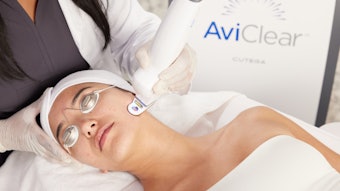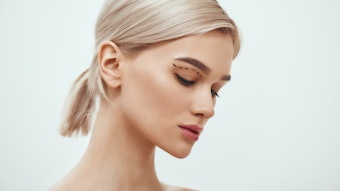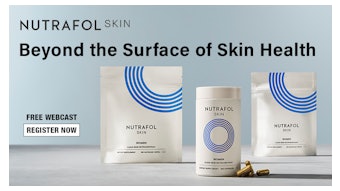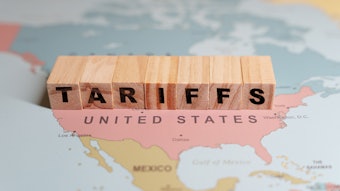
AI is transforming the beauty industry, offering cutting-edge tools that blend science with personalization to empower smarter skin care decisions. From Haut.AI’s SkinGPT-powered SPF Truth Booth, which uses generative AI to simulate the impact of UV exposure on your skin, to the growing demand for science-backed insights over influencer hype, technology is redefining how we care for our skin. Here’s how AI is shaping the future of beauty and sun safety.
AI-Driven Plant Cell Platform to Revolutionize Fragrance Industry
 “Orris is the crown jewel in perfumery,” said Debut founder and CEO Joshua Britton. “It is one of the most expensive and prized fragrance ingredients, costing more than gold even (up to $100,000 per kilogram)."devmarya at Adobe Stock
“Orris is the crown jewel in perfumery,” said Debut founder and CEO Joshua Britton. “It is one of the most expensive and prized fragrance ingredients, costing more than gold even (up to $100,000 per kilogram)."devmarya at Adobe Stock
“Orris is the crown jewel in perfumery,” Debut founder and CEO Joshua Britton told Global Cosmetic Industry sister publication, Perfumer & Flavorist. “It is one of the most expensive and prized fragrance ingredients, costing more than gold even (up to $100,000 per kilogram). Orris is also exceedingly rare because of its painstaking aging and cultivation process. After harvesting, it takes approximately five years to age the dried rhizome.”
Recreating the natural source’s odor signature is far from simple, Britton explained: “Orris is a highly complex mix of molecules with a unique and revered scent profile. It is a huge challenge to master… As our inaugural fragrance ingredient, orris also allows us to prove our biotechnology, and we are now optimizing our platform and creating a pipeline with large companies.”
Britton noted that AI will play a key role in reshaping the future of the fragrance palette: “Plant cell biotechnology will bring hitherto unseen innovation and performance to the fragrance industry. Fragrances from plants that are very hard to grow, or barely grow, will become new sources of inspiration. The joint forces of AI and biotechnology will design molecules that target specific receptors in the nose to impact mood, memory and function.”
He added, “Biotechnology will create a huge intellectual property moat in the fragrance industry thanks to novel, biotech-derived ingredients and AI that will confer differentiation and new functionality to fragrance formulas. It will allow brands to create novel solutions that they can legally protect for 20-plus years, in addition to outpacing the competition based on clinically-backed performance for the first time ever.”
Britton concluded, “Without access to novel ingredients, perfumers will have a severely restricted palette, both because of ever-encroaching ingredient regulation and a narrowing of creative possibilities. We look forward to neuroscents (functional fragrances), formulated with science-backed research, that trigger physiological responses and enhance mood and well-being.”
AI-Powered Personalized Medical-grade Skin Care
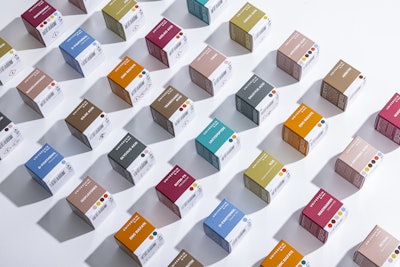 Alma recently introduced Universkin, an AI-driven medical skin care line that reportedly delivers hyper-personalized solutions for patients and physicians.Alma
Alma recently introduced Universkin, an AI-driven medical skin care line that reportedly delivers hyper-personalized solutions for patients and physicians.Alma
This innovation reflects the beauty industry's shift towards customization, with technology at the core of hyper-personalization. A recent Mintel reporta noted that 62% of U.S. beauty and personal care buyers are interested in personalized products, with 28% willing to pay more for them.
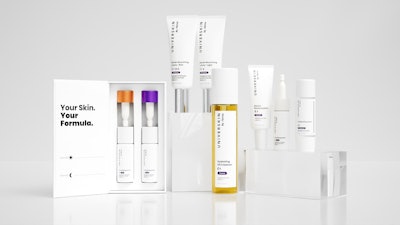 Universkin uses AI technology to analyze skin data from a facial image to recommend customized treatments. Alma
Universkin uses AI technology to analyze skin data from a facial image to recommend customized treatments. Alma
"By integrating advanced, science-backed ingredients with a personalized, smarter approach, we're empowering physicians to extend the impact of aesthetic care beyond the clinic and into every patient's daily routine,” said Lior Dayan, CEO of Alma.
"Personalization is the future of aesthetic medicine,” said Lawrence Iteld, MD, a board-certified plastic surgeon. “Every patient's skin is unique, and tailored treatments allow us to address their specific needs for the best possible results."
How AI Can Revolutionize Sun Safety for Gen Z and Millennials
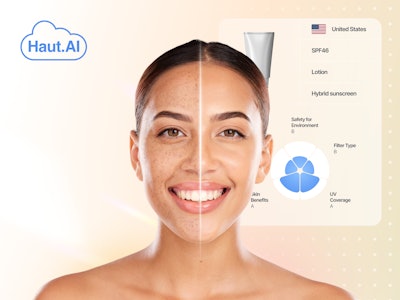 Haut.AI, a skin care SaaS company, has unveiled the SPF Truth Booth, a generative AI-powered sunscreen effectiveness test.Haut.AI
Haut.AI, a skin care SaaS company, has unveiled the SPF Truth Booth, a generative AI-powered sunscreen effectiveness test.Haut.AI
The SPF Truth Booth taps SkinGPT, Haut.AI’s proprietary generative AI engine, to deliver hyper-realistic, personalized simulations of long-term skin changes caused by UV exposure. By uploading a selfie, users can see side-by-side projections of their skin up to 10 years into the future, with one scenario showing proper sunscreen use and the other showing the effects of unprotected exposure to UV rays.
The SPF Truth Booth is rooted in peer-reviewed dermatological research and trained on a diverse global skin dataset, per the company. Haut.AI’s SkinGPT engine analyzes unique skin features—including texture, pigmentation and elasticity—to generate scientifically accurate predictions of how skin could age over time.
The launch of the SPF Truth Booth coincided with UV Safety Awareness Month, a campaign that promotes sun protection and skin cancer prevention. Despite repeated recommendations from dermatologists to wear broad-spectrum SPF daily, many people underestimate the long-term damage caused by UV exposure, the company argues. Haut.AI’s tool aims to bridge this gap by delivering clear, visual evidence that encourages consistent sunscreen use.
The company cites Circana data that reportedly showed that 87% of young skin care buyers trust scientific proof of performance over influencer endorsements. With viral skin care content driving interest among Gen Z and millennials, the SPF Truth Booth offers the transparent, science-based insights these audiences reportedly seek.
“Consumers are done with vague promises about product effectiveness,” said Anastasia Georgievskaya, CEO of Haut.AI. “They want proof. The SPF Truth Booth isn’t just a fun digital tool—it’s a science-backed educational experience that makes the benefits of daily sun protection vividly clear. We’re showing people the future of their skin, empowering them to make smarter choices today."
Footnotes




